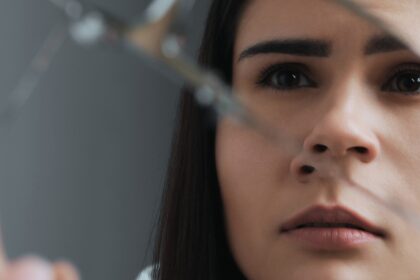The Supplement That Finally Cleared My Brain Fog (After Years of Struggling)
Let me back up and tell you a story.
I was 32 years old and terrified. I sat across from my doctor, tears streaming down my face, barely able to string together the right words to explain what was happening to me—because I couldn’t find them. Literal words. I’d be mid-sentence and the simplest terms would just vanish from my mind. My memory was a mess, I couldn’t focus on anything for more than a few minutes at a time, and I felt like I was constantly walking around in a thick, invisible cloud. The scariest part? I truly thought I might be showing signs of early-onset Alzheimer’s.
I remember sobbing to my doctor, telling her something was really wrong. That this wasn’t normal forgetfulness. That it felt like my brain wasn’t working anymore. I was scared out of my mind.
She didn’t ask about my diet, my sleep, my stress levels—nothing. She simply wrote a prescription for an antidepressant and told me it might help.
I left that appointment more defeated than ever. Not because I have anything against medication—it just wasn’t the answer I was looking for. It felt like a band-aid slapped on a deep wound that needed actual healing.
And yes, I did try it. Within a couple of days, I was sweating like I’d run a marathon, constantly jittery, and still couldn’t remember my grocery list two hours after I’d written it. I knew it wasn’t right for me. So I quit.
And then I did what a lot of women do when they don’t get the answers they need—I just dealt with it.
Fast Forward Five Years…
I finally went back to school to study nutrition. And let me tell you—learning how food impacts our body and brain was a massive lightbulb moment for me. I started experimenting with my own diet, and when I removed all grains (especially gluten), the brain fog lifted about 75%. That was huge.
But still, something was missing. There were still days I felt like my mind was dragging behind my body. Like I knew what I needed to do, but couldn’t quite do it.
Then one day, while listening to an Andrew Huberman podcast (my go-to for all things nerdy but useful), he mentioned L-Tyrosine—an amino acid that can support cognitive function, focus, and even symptoms of ADHD. I perked up immediately.
Let me break it down in a simple, non-jargony way (because if you’re anything like me, your eyes glaze over when things get too science-y).
What Even Is L-Tyrosine?
L-Tyrosine is an amino acid your body uses to make dopamine, norepinephrine, and epinephrine—aka, your focus, motivation, and alertness chemicals. These neurotransmitters help your brain function smoothly, especially during times of stress, fatigue, or when your attention span is hanging by a thread.
So if you’ve ever felt like your brain is in a fog, you’re scatterbrained, easily overwhelmed, or struggling to concentrate on literally anything, L-Tyrosine might be worth looking into.
It’s not a miracle drug—but for me, it’s come pretty close.
How I Use It
After hearing about it, I did some research (as a nutrition nerd does) and decided to give it a shot. I ordered the powdered version and started adding 3–5 grams to my morning coffee on days I felt especially slow or mentally cloudy.
And… wow.
Within an hour or so, I could feel my brain wake up. Suddenly I was remembering the things I needed to get done, finishing one task before jumping to the next (a big deal for me), and I wasn’t blanking on words mid-sentence like I used to. It was like someone flipped the switch back on.
Now, to be clear, I don’t take it every day. I’ve read enough to know that if you take L-Tyrosine too often without breaks, your body might down-regulate how it responds to it. So I treat it like a tool I use when I need it—kind of like a coffee for my brain. Only smarter.
A Quick Heads-Up
If you’re thinking about trying it, here are a few things to keep in mind:
Start small. Everyone’s body is different. Some people feel great on just 500mg, others (like me) do better with 3–5 grams. Ease in and listen to your body.
Don’t overuse it. You want to give your receptors a break sometimes so they don’t get too used to it. I personally take it 1–3 days a week, max.
Talk to your doctor if you’re on medications. Especially if you’re taking anything that affects dopamine (like antidepressants or ADHD meds), make sure there’s no interaction.
Why This Matters
I’m sharing this not because I think supplements are the solution to everything—but because I know what it’s like to feel terrified when your brain doesn’t work the way it used to.
I know what it’s like to feel invisible in a doctor’s office, to cry and ask for help, only to walk out feeling like no one really listened.
I know how hopeless it can feel when you’re still young but already feel like you’re losing pieces of yourself—and no one seems to have answers.
But I also know how powerful it is to find something that makes a difference.
I want you to know that brain fog, forgetfulness, and lack of focus aren’t just “normal” parts of aging you have to accept. Sometimes they’re signals—signs your body needs more support. Whether that’s food, rest, nutrients, or something deeper like hormones or trauma or stress—it’s worth exploring. You’re worth exploring.
And most importantly, you’re not crazy. You’re not lazy. You’re not broken.
Your brain just might need a little love. Maybe that love looks like cutting back on inflammatory foods. Maybe it’s learning about your cycle. Maybe it’s a walk in the sunshine. And maybe—just maybe—it’s something as simple as an amino acid your brain has been begging for.
One small tool changed everything for me.
And while I still have foggy days (who doesn’t?), I finally feel like I’m back in the driver’s seat again. No more panic. No more forgetting what I was saying mid-thought. No more crying in the doctor’s office wondering if I was slowly slipping away.
I’m here. I’m clear. And I’m just getting started.
If you’ve been where I was, I hope this helps you feel a little less alone—and a little more hopeful.




